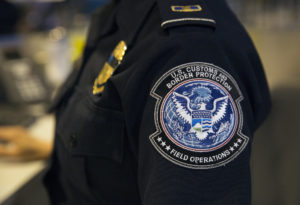The Trump Administration Is Breaking Up Families Because It Can
A Salvadoran father provided evidence that he's not a member of the MS-13 gang. The U.S. government separated him from his children anyway. U.S. Customs and Border Patrol agents at the Mexican border in Imperial County, Calif. (Matt York / AP)
U.S. Customs and Border Patrol agents at the Mexican border in Imperial County, Calif. (Matt York / AP)
In early November, U.S. Customs and Border Protection officers accused a Salvadoran father – known in court documents only as “Mr. A” – of being an MS-13 gang member.
They didn’t show him any evidence to back up their claim. Mr. A denied he was ever part of the group and stripped off his clothes to prove he wasn’t hiding any gang-related tattoos.
Still, the officers didn’t believe him. On Nov. 5, officers hauled Mr. A out of a Texas immigration detention facility to court for a hearing. When he returned to his cell that day, his 11-year-old daughter and 9-year-old son were gone.
He hasn’t seen them in the nearly three months since, even though the government hasn’t offered any proof of his gang membership. Mr. A’s lawyers have compiled a stack of evidence to the contrary.
They’ve submitted a document from El Salvador’s Ministry of Justice and Public Safety confirming that their client doesn’t have a criminal record. A letter from his former employer, an art supply store in San Salvador where Mr. A worked for the past 13 years, describes him as an upstanding colleague and manager.
They’ve also filed a photo that shows Mr. A at the beach with his daughter, to prove he doesn’t have any MS-13 tattoos.
“We’ve asked for information, and we haven’t been given any,” said Laura Peña, a lawyer in Mr. A’s case who works with the Texas Civil Rights Project. “We don’t know what information the government has, so it’s hard for us to counter the allegation.”
More than six months after President Donald Trump announced the end of his administration’s family separation policy, Mr. A’s case highlights the government’s ongoing practice of breaking up families at the U.S.-Mexico border.
Between April and June, officials separated more than 2,700 children from their families under the so-called “zero tolerance” policy. After increasing backlash from lawmakers and the public, Trump ended the practice June 20.
But nearly 120 migrant children were split up from families between the formal end of family separation and early November, according to a recent report by the Department of Health and Human Services’ inspector general’s office. In the majority of these new cases, the report notes, parents are accused of having criminal records or gang affiliations. Allegations in some cases are based on unsubstantiated claims or minor infractions, ProPublica reported in November.
It’s an issue that’s garnered the attention of Lee Gelernt, the lead ACLU attorney in the case that resulted in the reunification of families split up during zero tolerance.
“We have raised this issue with the court and plan to keep doing so,” he said. “We have received information about these types of separations only after pushing hard for information, and the information we have received is usually minimal and inadequate.”
The Department of Homeland Security declined to comment. Lawyers representing the government have not filed records in court supporting its claim against Mr. A.
The Texas Civil Rights Project regularly visits the McAllen immigration court near the border to screen immigrants being prosecuted for illegal entry who may have been separated from their children. They’ve identified a few cases similar to Mr. A’s in which the basis for separation is unclear.
“That’s the big problem with these vague allegations,” said Peña, a former federal Immigration and Customs Enforcement attorney. “You have a Border Patrol agent out in the field who looks up some system and sees a flag. It’s not a criminal conviction. There’s just some sort of information in a system.”
Mr. A’s case was delayed due to the government shutdown, but is expected to progress in the coming weeks.
According to the inspector general’s report, the Department of Homeland Security also shares few details about the basis for separations with other government agencies. The federal Office of Refugee Resettlement, for instance, must evaluate the criminal record of parents as part of its process for placing children in homes.
“From a child welfare perspective, not all criminal history rises to a level that would preclude a child from being placed with his or her parent,” the report states. But in some cases, the department provided little information about the nature of parents’ criminal records to the refugee agency. That could “impede ORR’s ability to determine the appropriate placement for a child,” the report says.
Mr. A maintains he’s never been involved with MS-13. “We believe him,” Peña said.
Court records provide a detailed account of his case. In April, gang members began threatening Mr. A and gave him a choice: Pay $1,300 or his children would die. Mr. A moved his family to another city in El Salvador on Oct. 7. But the threats continued.
“They told me to think about my children,” Mr. A told an asylum officer, according to a transcript of the interview the government conducts to establish whether someone has a “credible fear” of returning to his or her home country. He reported the threats to the authorities in El Salvador, but a prosecutor told him officials couldn’t help without the names of the gang members.
After crossing into the U.S. on Nov. 2, the family was apprehended by border officers, who took them to a detention facility. Two days later, they were shuffled on a bus to another holding area called the “ice box,” where migrants are kept in a cold concrete room. On Nov. 5, when Mr. A returned from a court hearing, his children were gone.
“Mr. A was not informed of, and did not consent to, the impending separation and was given no opportunity to contest it,” court filings state. “In fact, the officers concealed the impending separation from Mr. A by promising that his children would still be at the detention facility when he returned from his court appearance.”
Since their separation, Mr. A “grew increasingly despondent and withdrawn,” his lawyers say. He’s lost more than 20 pounds and has frequent nightmares and depression. During his credible fear interview, he asked for his son and daughter. He failed the interview, records state, and is being held at the Webb County Detention Center in Laredo, Texas. His lawyers are appealing the asylum case.
His children remain at a Texas shelter, Peña said, and have spoken to their father only a few times since they were separated.
“The emotional and mental trauma is severe for both kids,” Peña said. “The harm is being done every day.”
Your support matters…Independent journalism is under threat and overshadowed by heavily funded mainstream media.
You can help level the playing field. Become a member.
Your tax-deductible contribution keeps us digging beneath the headlines to give you thought-provoking, investigative reporting and analysis that unearths what's really happening- without compromise.
Give today to support our courageous, independent journalists.






You need to be a supporter to comment.
There are currently no responses to this article.
Be the first to respond.